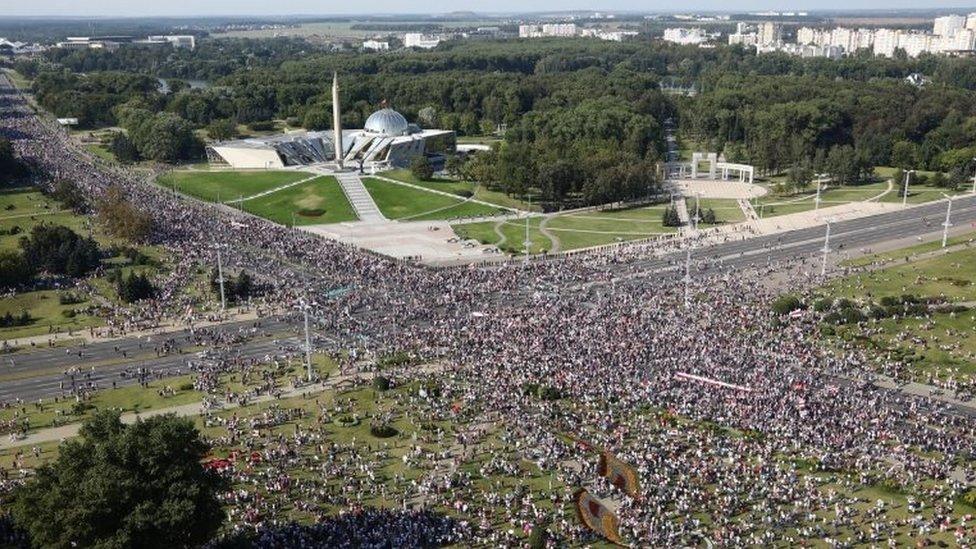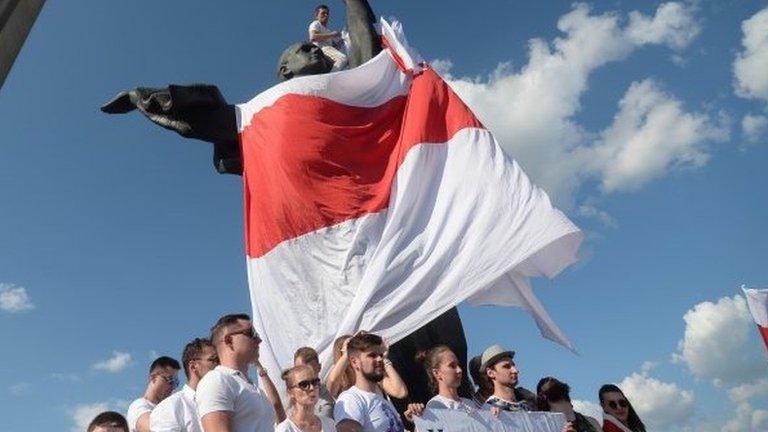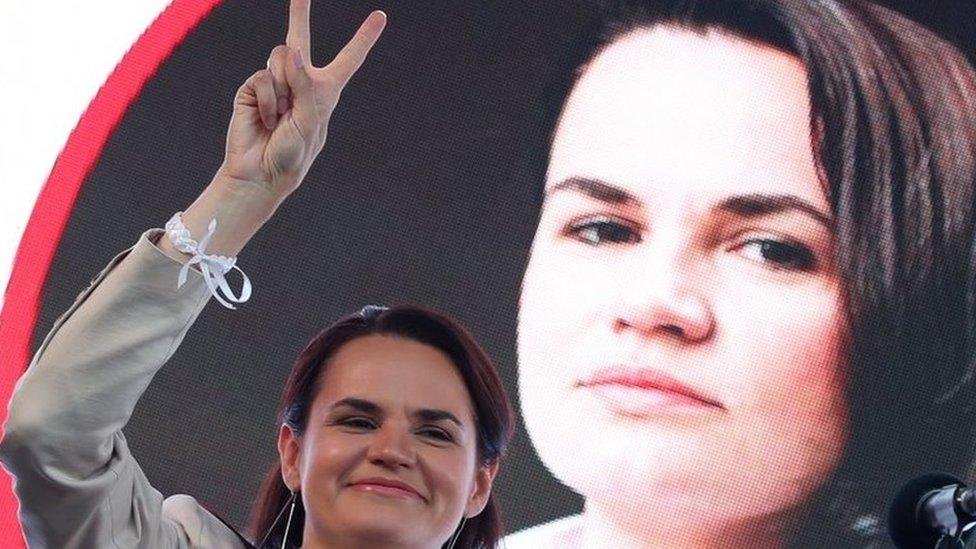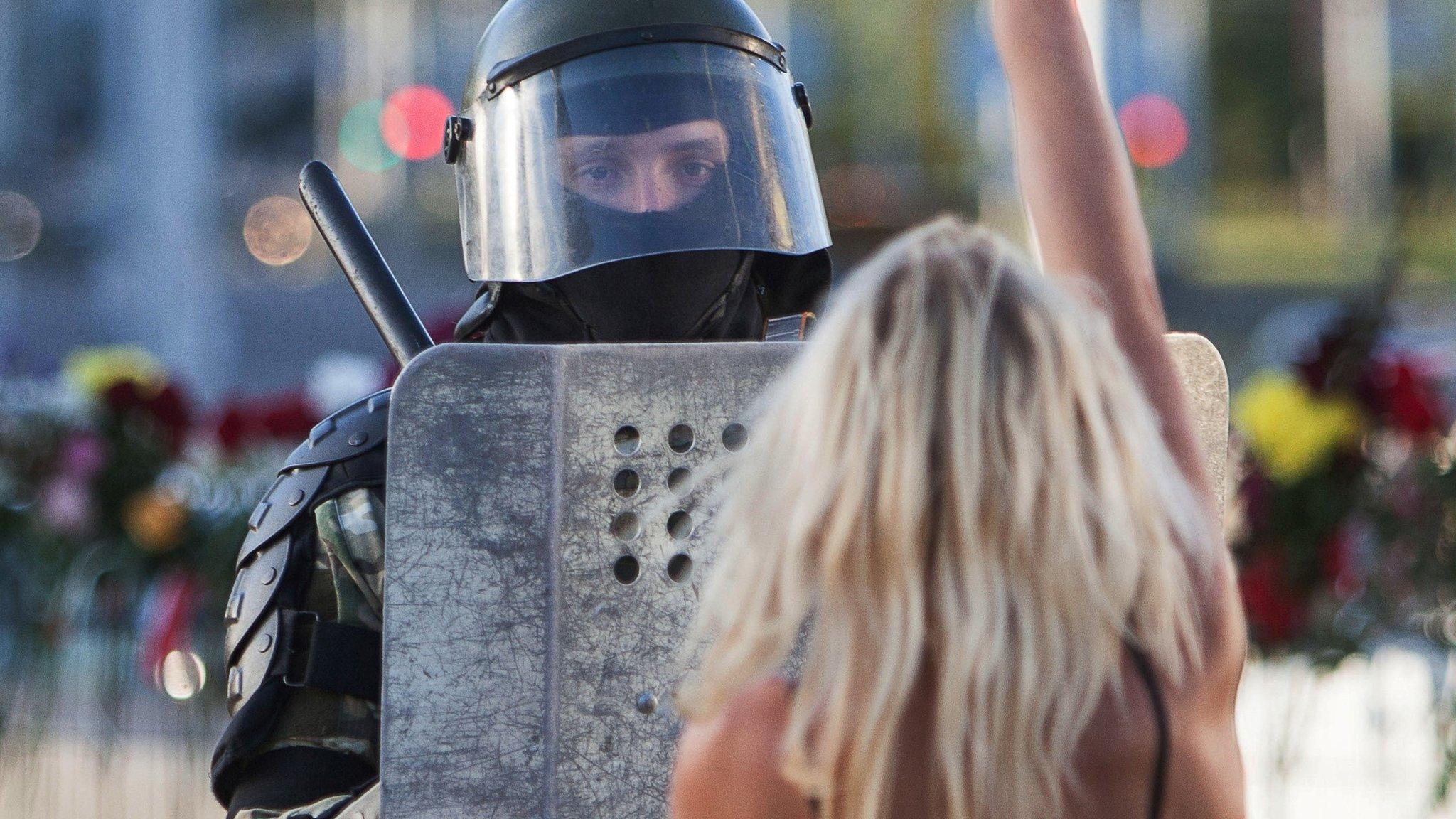Belarus protest: Mass rally keeps pressure on Lukashenko
- Published
Dozens arrested in Belarus as they took to the streets over the 9 August election, widely believed to have been rigged
Tens of thousands have again taken to the streets in Belarus, facing off against riot police to protest against President Alexander Lukashenko.
A huge police presence cordoned off areas such as Independence Square in the capital, Minsk, and the interior ministry reported at least 140 arrests.
Protesters chanted "disgrace" and "leave" in standoffs with police.
Belarus has been gripped by mass protests since the 9 August election, widely believed to have been rigged.
Mr Lukashenko, who has been in power for 26 years, has said he has no intention of stepping down and denies electoral fraud.
What happened on the streets?
It was very tense, with large numbers of riot police facing off against lines of protesters carrying balloons, flowers and red-and-white opposition flags.
Reporting at the height of the protests, the BBC's Steve Rosenberg in Minsk said there were far more police than on the past two Sundays when similar rallies were held. Some protesters lay down on the road to try to prevent riot police from moving, with others chanting "disgrace" and "go away".
Some mocked Mr Lukashenko on his 66th birthday, carrying a cockroach puppet and chanting "happy birthday, you rat".
Many streets were blocked off by police to try to prevent people reaching the main protest areas.
One large group of protesters marched towards Mr Lukashenko's residence at the Independence Palace, which was heavily protected by riot police and water cannon vehicles.
Armoured personnel carriers were seen moving in the area, although reports later said they were also seen leaving and that the crowds were dispersing largely peacefully.
Other smaller protests were reported in towns such as Brest and Grodno.

Vast numbers gathered around the Hero City monument in Minsk to demand the end of President Lukashenko's rule
Journalists continue to face issues reporting the unrest. On Saturday, the authorities withdrew the accreditation of 17 reporters, most of them Belarusian citizens who have been reporting for foreign media outlets.
Two journalists with the BBC's Russian service were among those affected. In a statement, the BBC said it condemned "in the strongest possible terms this stifling of independent journalism".
On Sunday, Germany said it was summoning the Belarus ambassador over the revocations of accreditation.

Future uncertain in tense Minsk

Another Sunday. Another big protest.
But this one felt different from previous weekends.
Having cordoned off Independence Square in the centre of Minsk, police made a move against some of the protesters. Following scuffles, suddenly there were riot police everywhere: banging their shields on the ground as a warning, and then pushing demonstrators further down the road.
But the police couldn't stop the protest from re-locating to another part of the city.
What happens next in Belarus depends on many things: on the determination of protesters to keep taking to the streets; on whether Mr Lukashenko's security forces stay loyal to him; and on decisions taken to the East - in the Kremlin. Vladimir Putin has already made it clear he's keeping a close eye on events in Belarus.
BBC's Steve Rosenberg amid the stand-off between protesters and riot police
Has Lukashenko reacted?
There is no direct word, although the interior ministry confirmed 140 arrests.
Mr Lukashenko's press secretary sent Russian media outlet Ria Novosti a picture of him carrying a machine gun outside the Independence Palace.
Allow X content?
This article contains content provided by X. We ask for your permission before anything is loaded, as they may be using cookies and other technologies. You may want to read X’s cookie policy, external and privacy policy, external before accepting. To view this content choose ‘accept and continue’.

Last Sunday, he was seen wearing a flak jacket and carrying an assault rifle.
Russian President Vladimir Putin telephoned Mr Lukashenko on his birthday and reportedly invited him to visit Moscow.
It appeared to be the latest sign of Kremlin support for a president who has not always been seen positively by Russia.
But Mr Putin has said he has formed a police reserve force to intervene in Belarus if necessary, although "it won't be used until the situation gets out of control".
What's the background?
Unrest in Belarus was triggered earlier this month by an election widely believed to have been rigged in favour of Mr Lukashenko.
The leading opposition candidate, Svetlana Tikhanovskaya, was detained the day after the vote and left for Lithuania, from where she has since called for protests.
Belarus has seen unprecedented opposition demonstrations and workers have staged walkouts at major state enterprises. Thousands have been arrested and there have been numerous reports of police brutality.
What lies behind the Belarus protests?
At least four people have died and hundreds have been injured.
The European Union and the US are among those to reject the election as neither free nor fair. The EU is preparing sanctions against officials it accuses of rigging the result to deliver Mr Lukashenko's victory and of cracking down on the opposition movement.
Mr Lukashenko claimed a sixth term when election authorities said he had won 80% of the vote. But Ms Tikhanovskaya said she had won 60-70% based on results that had been properly counted.
A criminal case has targeted the Co-ordination Council, which has since been set up by the opposition. Mr Lukashenko accuses it of trying to seize power.
The most prominent opposition leader inside Belarus, Maria Kolesnikova, has been questioned by prosecutors - as has Nobel literature prize-winner Svetlana Alexievich.
- Published8 September 2020

- Published1 August 2020

- Published13 August 2020
